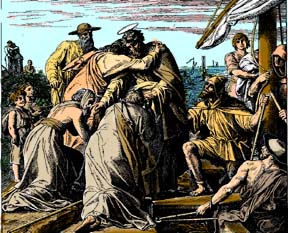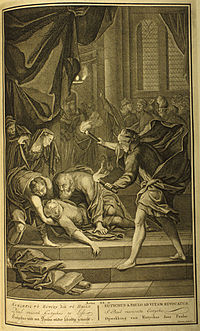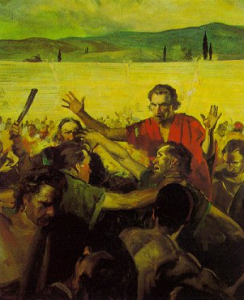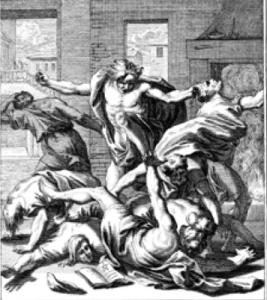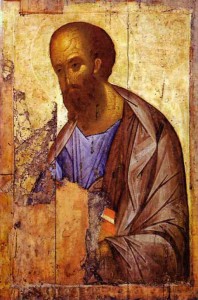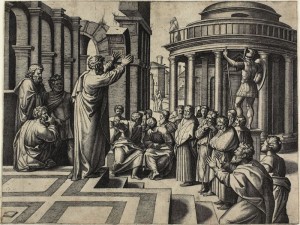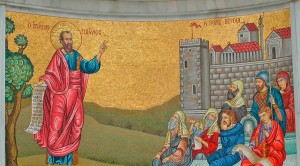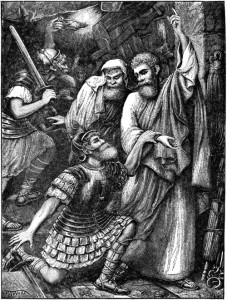1 And when we had parted from them and set sail, we came by a straight course to Cos, and the next day to Rhodes, and from there to Patara. 2 And having found a ship crossing to Phoenicia, we went aboard and set sail. 3 When we had come in sight of Cyprus, leaving it on the left we sailed to Syria and landed at Tyre, for there the ship was to unload its cargo. 4 And having sought out the disciples, we stayed there for seven days. And through the Spirit they were telling Paul not to go on to Jerusalem. 5 When our days there were ended, we departed and went on our journey, and they all, with wives and children, accompanied us until we were outside the city. And kneeling down on the beach, we prayed 6 and said farewell to one another. Then we went on board the ship, and they returned home. 7 When we had finished the voyage from Tyre, we arrived at Ptolemais, and we greeted the brothers and stayed with them for one day. 8 On the next day we departed and came to Caesarea, and we entered the house of Philip the evangelist, who was one of the seven, and stayed with him. 9 He had four unmarried daughters, who prophesied. 10 While we were staying for many days, a prophet named Agabus came down from Judea. 11 And coming to us, he took Paul’s belt and bound his own feet and hands and said, “Thus says the Holy Spirit, ‘This is how the Jews at Jerusalem will bind the man who owns this belt and deliver him into the hands of the Gentiles.’” 12 When we heard this, we and the people there urged him not to go up to Jerusalem. 13 Then Paul answered, “What are you doing, weeping and breaking my heart? For I am ready not only to be imprisoned but even to die in Jerusalem for the name of the Lord Jesus.” 14 And since he would not be persuaded, we ceased and said, “Let the will of the Lord be done.” 15 After these days we got ready and went up to Jerusalem. 16 And some of the disciples from Caesarea went with us, bringing us to the house of Mnason of Cyprus, an early disciple, with whom we should lodge.
There seems to be two general approaches to the idea of death among non-believers: fear or defiance. Many people, perhaps most, have a deep and unsettling fear of death. John Stott provides two examples.
Death inspires terror in many people. Woody Allen’s angst in relation to death is well known. He sees it as a total annihilation of being and finds it “absolutely stupefying in its terror.” “It’s not that I’m afraid to die,” he quips,” I just don’t want to be there when it happens.”
Another similar example is given by Ronald Dworkin QC, the American legal philosopher, who has held chairs in London, Oxford and New York universities. He has written: “Death’s central horror is oblivion – the terrifying absolute dying of the light…Death has dominion because it is not only the start of nothing, but the end of everything.”[1]
The other response is defiance, a kind of angry shaking of one’s fist against death. We may think, for instance, of Dylan Thomas’ famous 1951 poem, “Do Not Go Gentle Into That Good Night.”
Do not go gentle into that good night,
Old age should burn and rave at close of day;
Rage, rage against the dying of the light.
Though wise men at their end know dark is right,
Because their words had forked no lightning they
Do not go gentle into that good night.
Good men, the last wave by, crying how bright
Their frail deeds might have danced in a green bay,
Rage, rage against the dying of the light.
Wild men who caught and sang the sun in flight,
And learn, too late, they grieved it on its way,
Do not go gentle into that good night.
Grave men, near death, who see with blinding sight
Blind eyes could blaze like meteors and be gay,
Rage, rage against the dying of the light.
And you, my father, there on the sad height,
Curse, bless, me now with your fierce tears, I pray.
Do not go gentle into that good night.
Rage, rage against the dying of the light.
I actually love that poem, but it certainly is a challenge to the inevitability of death. Thomas calls upon his father and, ostensibly, all of us to rage against death!
More sinister is a poem that served as the last words of one of America’s most infamous criminals. On April 19, 1995, Timothy McVeigh detonated a truck bomb the Alfred P. Murrah Federal Building in Oklahoma City, OK. The explosion killed 168 people and wounded over 600 others. On June 11, 2001, McVeigh was executed by lethal injection at a penitentiary in Indiana. His last words were a poem that he had copied on paper by hand and handed to the jailor. It was a poem written by William Ernest Henley in 1875 entitled “Invictus.” Here it is:
Out of the night that covers me,
Black as the pit from pole to pole,
I thank whatever gods may be
For my unconquerable soul.
In the fell clutch of circumstance
I have not winced nor cried aloud.
Under the bludgeonings of chance
My head is bloody, but unbowed.
Beyond this place of wrath and tears
Looms but the Horror of the shade,
And yet the menace of the years
Finds and shall find me unafraid.
It matters not how strait the gate,
How charged with punishments the scroll,
I am the master of my fate,
I am the captain of my soul.
As a Christian, I find those words chilling. They certainly would not have been quoted by Paul. Paul saw himself as anything but the captain of his own soul. He had come to terms with that issue back on the Damascus road. Christ held the papers to his soul and Christ was his captain.
In fact, Paul’s whole attitude to death was dramatically different from the examples I quoted above. As he continues his journey toward Jerusalem, he demonstrates this in a most memorable way.
Paul receives numerous warnings about going to Jerusalem.
The occasion for Paul’s demonstration of his own peace concerning death was the frequent warnings he received about going to Jerusalem from his friends.
1 And when we had parted from them and set sail, we came by a straight course to Cos, and the next day to Rhodes, and from there to Patara. 2 And having found a ship crossing to Phoenicia, we went aboard and set sail. 3 When we had come in sight of Cyprus, leaving it on the left we sailed to Syria and landed at Tyre, for there the ship was to unload its cargo. 4 And having sought out the disciples, we stayed there for seven days. And through the Spirit they were telling Paul not to go on to Jerusalem.
It is noteworthy that Luke says Paul’s friends were warning him “through the Spirit.” It raises an interesting question about who was hearing the Spirit speak most accurately, Paul or his friends. Regardless, the warnings persisted apparently everywhere he turned.
5 When our days there were ended, we departed and went on our journey, and they all, with wives and children, accompanied us until we were outside the city. And kneeling down on the beach, we prayed 6 and said farewell to one another. Then we went on board the ship, and they returned home. 7 When we had finished the voyage from Tyre, we arrived at Ptolemais, and we greeted the brothers and stayed with them for one day. 8 On the next day we departed and came to Caesarea, and we entered the house of Philip the evangelist, who was one of the seven, and stayed with him. 9 He had four unmarried daughters, who prophesied.
We are privileged at this point to get a glimpse into the home life of Philip, one of the original deacons. You will remember that Philip has an amazing impact on Samaria during the dispersion of the Jewish believers after the martyrdom of Stephen. His story is told in Acts 8.
4 Now those who were scattered went about preaching the word. 5 Philip went down to the city of Samaria and proclaimed to them the Christ. 6 And the crowds with one accord paid attention to what was being said by Philip when they heard him and saw the signs that he did. 7 For unclean spirits, crying out with a loud voice, came out of many who had them, and many who were paralyzed or lame were healed. 8 So there was much joy in that city.
Philip also famously led the Ethiopian Eunuch to Christ and did many other great things in the name of Christ. And now we see that he had a family that was likewise involved in transformative ministry for the Kingdom of God. “He had four unmarried daughters,” Luke tells us, “who prophesied.” This is a tantalizing insight and it raises questions for us today. What did this ministry of prophesy look like? How did it work? It is hard to say for sure, but they were not the first female prophets mentioned in the Bible. Furthermore, they appear to be a fulfillment of Peter’s quotation of the prophet Joel in his Pentecost sermon in Acts 2.
14 But Peter, standing with the eleven, lifted up his voice and addressed them: “Men of Judea and all who dwell in Jerusalem, let this be known to you, and give ear to my words. 15 For these people are not drunk, as you suppose, since it is only the third hour of the day. 16 But this is what was uttered through the prophet Joel: 17 “‘And in the last days it shall be, God declares, that I will pour out my Spirit on all flesh, and your sons and your daughters shall prophesy, and your young men shall see visions, and your old men shall dream dreams
“Your daughters shall prophesy,” Joel had said, and here we see the daughters of Philip doing precisely that! Let me simply say this: whatever your view on women in the ministry, it seems perfectly clear that they were not intended to be mere wallflowers in the Church. While the pastoral office would appear to be restricted to men, any theology that would tell a woman that she can literally never speak would violate what we see here as well as numerous other examples in the New Testament.
Paul was no doubt thrilled to be able to spend some time with this great man of God and his fascinating family. He then receives another warning, this time from a male prophet.
10 While we were staying for many days, a prophet named Agabus came down from Judea. 11 And coming to us, he took Paul’s belt and bound his own feet and hands and said, “Thus says the Holy Spirit, ‘This is how the Jews at Jerusalem will bind the man who owns this belt and deliver him into the hands of the Gentiles.’” 12 When we heard this, we and the people there urged him not to go up to Jerusalem.
Agabus appeals to the Holy Spirit, as did all who warned Paul. But Paul saw himself as being faithful to the Spirit’s leadership by going to Jerusalem. So, again, who was hearing the Spirit rightly? What is likely happening here is that Paul’s friends are being told by the Spirit that Paul will face persecution and suffering if he moves forward toward Jerusalem and they, on that basis, plead with him not to go. But the Spirit’s revelation of future suffering does not mean that the Spirit Himself was calling upon Paul not to go. That was simply the natural reactions of friends to what the Spirit was revealing.
Clinton Arnold put it nicely when he said this:
There is probably no contradiction here. It appears that the Spirit is telling prophets in a variety of places that Paul will face suffering and imprisonment in Jerusalem. The prophets conclude, out of their natural human concern, that Paul should not go to Jerusalem in order to avoid the persecution. Paul, however, is thoroughly convinced that the Spirit is leading him to go. He is willing to suffer anything for the sake of Christ.[2]
So Paul is warned, repeatedly, not to go to Jerusalem. However, he has set his face toward the great city and will not be distracted from his task.
Paul, freed from the fear of physical death, was free to be courageous with his life.
In response to the pleadings of his friends, Paul reveals just how freed he had become from the fear of death.
13 Then Paul answered, “What are you doing, weeping and breaking my heart? For I am ready not only to be imprisoned but even to die in Jerusalem for the name of the Lord Jesus.” 14 And since he would not be persuaded, we ceased and said, “Let the will of the Lord be done.” 15 After these days we got ready and went up to Jerusalem. 16 And some of the disciples from Caesarea went with us, bringing us to the house of Mnason of Cyprus, an early disciple, with whom we should lodge.
How moving! Paul was ready for whatever lay ahead of him, even suffering and death. Again, he had come to peace with these things and, in his mind, his friends needed to do the same. According to Jaroslav Pelikan, Paul “manifested…a fierce sense of determination, which was sometimes difficult to distinguish from just plain stubbornness.” He went on to say that “one almost expects a ‘sigh’…in the sentence, ‘And when he would not be persuaded, we ceased and said, ‘The will of the Lord be done.’”[3] It is easy to imagine such a sigh. No doubt his friends were somewhat exasperated, but no doubt they also had the deepest respect for Paul’s dogged determination and steely resolve to do what he felt the Lord was calling him to do.
It is amazing to observe just how free Paul was from the fears that so enslave many of us. Paul, freed from the fear of physical death, was free to be courageous with his life. He was liberated by setting aside the fear-based clinging to life that had no doubt early enslaved him. Christ had broken the shackles of fear by giving him a new life…and that had come at the expense of the old life he previously new. Paul put this perhaps nowhere more beautifully than in Galatians 2:20.
I have been crucified with Christ. It is no longer I who live, but Christ who lives in me. And the life I now live in the flesh I live by faith in the Son of God, who loved me and gave himself for me.
He did not fear crucifixion simply because he had already been crucified on Calvary with Christ! His old life ended at the foot of the cross and he now walked in resurrection power! Christ, to put it simply, was his life.
How beautiful would it be to live with this perspective and to walk in this reality?! How wonderful would it be to be free of the fear of death?!
Other Christians have gotten close to this blessed freedom. On May 25, 1994, Aleksandr Solzhenitsyn was asked by a reporter if he was afraid of death.
David Remnick had asked him if he feared dying. His face lit up with pleasure. “Absolutely not! It will just be a peaceful transition. As a Christian, I believe there is a life after death, and so I understand that this is not the end of life. The soul has a continuation, the soul lives on. Death is only a stage, some would even say a liberation. In any case, I have no fear of death.”[4]
“I have no fear of death!” There it is! That is it!
In 160 A.D., the church father Justin Martyr wrote his own testimony, noting therein that, like the jailor in Acts 16, it was the bold and unflagging witness and joy of the Christians in the midst of persecution that drew him to the faith:
When I was delighting in the doctrines of Plato, I heard Christians being slandered. Yet, I saw that they were fearless in death and unafraid of all other things that are considered fearful. And I realized that it was impossible that they could be living in wickedness and pleasure. For what sensual or intemperate person…could welcome death, which would deprive him of his enjoyments? Such a person would prefer to continue always in the present life.[5]
It was the fearlessness of suffering Christians that so impacted Justin Martyr. Consider this the evangelistic tool of fearlessness. It made an impact then and would make a similar impact now if we could really trust Christ enough to be free of fear.
I ask you: are you free from the fear of death? When others watch you and listen to you discuss the inevitability of dying, what do they hear in your voice? Fear? Trepidation? Uncertainty? Dread?
Ah, may they hear a joyful confidence in our voices that we know death has no power over us…for we have died already and will rejoice to go home to our King!
[1] John Stott, The Radical Disciple (Downers Grove, IL: InterVarsity Press, 2010), p.128.
[2] Clinton E. Arnold, “Acts.” Zondervan Illustrated Bible Backgrounds Commentary. Vol.2. Clinton E. Arnold, gen. ed. (Grand Rapids, MI: Zondervan, 2002), p.428-429.
[3] Jaroslav Pelikan, Acts. Brazos Theological Commentary on the Bible. (Grand Rapids, MI: Brazos Press, 2005), p.230.
[4] D.M. Thomas. Alexander Solzhenitsyn: A Century in His Life. (New York: St. Martin’s Press, 1998), p.509.
[5] A Dictionary of Early Christian Beliefs, ed. David W. Bercot (Peabody, MA: Hendrickson Publishers, 1998), p.174-175.


